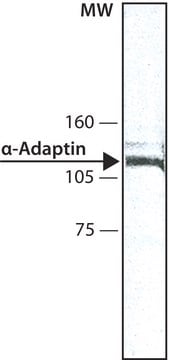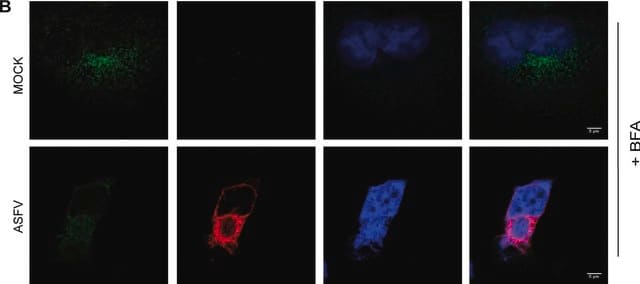A4450
Monoclonal Anti-β1 and β2-Adaptins antibody produced in mouse
clone 100/1, ascites fluid
Synonym(e):
Anti-AP-1 and AP-2
About This Item
Empfohlene Produkte
Biologische Quelle
mouse
Konjugat
unconjugated
Antikörperform
ascites fluid
Antikörper-Produkttyp
primary antibodies
Klon
100/1, monoclonal
Enthält
15 mM sodium azide
Speziesreaktivität
human, bovine, rat
Methode(n)
indirect immunofluorescence: suitable
microarray: suitable
western blot: 1:200 using rat brain extract
Isotyp
IgG1
Versandbedingung
dry ice
Lagertemp.
−20°C
Posttranslationale Modifikation Target
unmodified
Angaben zum Gen
human ... AP1B1(162) , AP2B1(163)
rat ... Ap1b1(29663) , Ap2b1(140670)
Allgemeine Beschreibung
Immunogen
Anwendung
Biochem./physiol. Wirkung
Physikalische Form
Haftungsausschluss
Not finding the right product?
Try our Produkt-Auswahlhilfe.
Lagerklassenschlüssel
10 - Combustible liquids
WGK
WGK 3
Flammpunkt (°F)
Not applicable
Flammpunkt (°C)
Not applicable
Analysenzertifikate (COA)
Suchen Sie nach Analysenzertifikate (COA), indem Sie die Lot-/Chargennummer des Produkts eingeben. Lot- und Chargennummern sind auf dem Produktetikett hinter den Wörtern ‘Lot’ oder ‘Batch’ (Lot oder Charge) zu finden.
Besitzen Sie dieses Produkt bereits?
In der Dokumentenbibliothek finden Sie die Dokumentation zu den Produkten, die Sie kürzlich erworben haben.
Unser Team von Wissenschaftlern verfügt über Erfahrung in allen Forschungsbereichen einschließlich Life Science, Materialwissenschaften, chemischer Synthese, Chromatographie, Analytik und vielen mehr..
Setzen Sie sich mit dem technischen Dienst in Verbindung.








